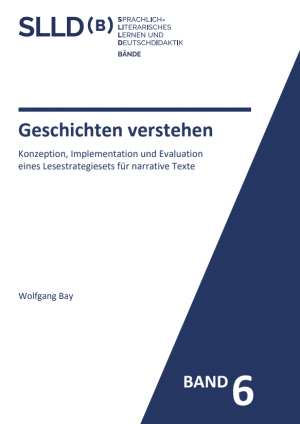Geschichten verstehen: Konzeption, Implementation und Evaluation eines Lesestrategiesets für narrative Texte
Keywords:
Narratologie, Textverstehen, Literarisches lernen, Lesestrategien, Vorstellungsbildung, Story grammar, LeseverstehensstrategienSynopsis
How does reading comprehension of narrative texts work? Which processes are involved? And how can students be supported in their understanding? These issues are genuine research questions of reading and literature didactics, which the present study Geschichten verstehen also deals with. It focusses on the events represented in texts, and on how understanding series of events can be supported. The study follows two assumptions adapted from cognitive psy-chology.
(1) The understanding of the histoire, the (re)construction of plot is an important component of understanding narrative texts, which can be supported by the explicit instruction of a story schema.
The dynamics of the character's action between its initial impulse and reaching or missing the goal of the action, which is captured in this schema, is complemented by a static dimension of description. For narrative texts are not exclusively narrative. Narration also includes the de-scriptive mode, the description of the depicted world in which the action is situated. This trig-gers the second assumption.
(2) During reception, dynamic and static images are evoked. These mental images sup-port the construction of meaning. Readers who develop rich conceptions of the narrated world during reading find it easier to build mental models of a story.
Both assumptions are based on cognitive psychological models of reading comprehension: The story schema functions as a narrative superstructure and thus as a controlling element in the macro-strategic comprehension of complex narrative texts. The generation of mental images supports the formation of inferences, the integration of world knowledge, and the elaboration of textual worlds.
In this context, these two facets of comprehending narrative texts are modeled as reading com-prehension strategies. A set of macro-strategies based on the story schema serves as the or-ganizing strategy. The generation of mental images is framed as an elaboration strategy. In order to teach the two types of strategies, a research-based series of lessons is designed for sixth grade (German) language and literature lessons. With the help of story elements, the students learn to structure narrative texts, to identify central information and to reconstruct the plot. With a dynamic visualization strategy, even the students who have difficulty generating mental images learn to visualize mentally while reading.
The program that emerges is implemented in regular (German) language and literature lessons and passes the practicality test in the formative pre-study with N = 108 students as well as in the main study with N = 497 students. The results of the study will be used to determine whether the input described above leads to a significant improvement in reading comprehension. In addition, the implementation suitability of the program will be evaluated. Analysis of the data leads to the following results:
- The structure of the training as well as the materials and texts are appropriate for the level of the students in the sixth grade and can be used at all levels through quantitative and qualitative differentiation.
- The strategy program Geschichten verstehen can be implemented in regular (German) lan-guare and literature lessons.
- The statistical analyses show relevant effects of the program (effect size d = 0.54) on reading comprehension, especially for weaker readers. 82% of the students benefited from the strategy training Geschichten verstehen, both, in long and short terms. In addition, based on the teach-ers' statements, a positive influence of the program on other levels of reading competence besides reading comprehension can be assumed.
Due to the positive results regarding its implementation suitability, practicability and effective-ness, the use of the strategy set can be strongly recommended for all school levels.

Downloads
Published
Series
License

This work is licensed under a Creative Commons Attribution-ShareAlike 4.0 International License.

